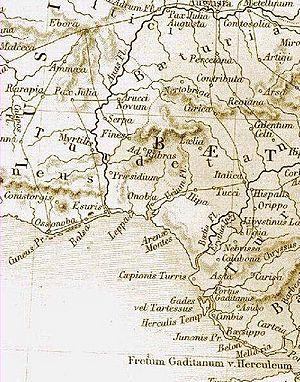Myrtilis Iulia facts for kids

Map of the Gulf of Cádiz in Roman times, with Myrtilis visible to the left of center, on the Anas river.
|
|
| Location | present day Mértola, Portugal |
|---|---|
| Coordinates | 37°38′25″N 7°39′40″W / 37.64028°N 7.66111°W |
| Type | Settlement |
| History | |
| Cultures | Roman |
Myrtilis Iulia was the Roman name for a very old town in Portugal, known today as Mértola. This place was important long ago because of its great location by a river. Different groups of people lived here over time, like the Phoenicians, Carthaginians, and especially the Romans.
Contents
Myrtilis Iulia: An Ancient River Town
The area where Myrtilis Iulia was located has been lived in for a very long time. People were here even during the Iron Age. Early groups like the Conni and Cynetes lived here. They were also influenced by the Phoenicians, who were skilled traders from the Middle East.
Why Location Mattered
Mértola's location was super important for its early growth. It was built on a hill right by the Guadiana river. This part of the river was the farthest north that boats could travel.
This meant that farm products from nearby villages could be sent out. Also, valuable metals like silver, gold, and tin from the Alentejo region were brought here. From Mértola's river port, these goods traveled down the Guadiana river. They then went to southern Hispania (what is now Spain) and across the Mediterranean Sea.
Roman Rule and Growth
Myrtilis Iulia became very important during the time of the Roman Empire. It is said that a young Julius Caesar set up a strong base here. This happened when Pompey was a governor in Hispania.
Myrtilis Iulia became a key spot for the Roman army. It was a starting point for their campaigns to conquer the Iberian Peninsula.
Between the 1st and 2nd centuries AD, Myrtilis was part of a bigger region called Pacensis. The capital of this region was Beja, also known as Pax Iulia. Myrtilis became a busy trading center. It was so important that it was allowed to make its own coins!
The town was even given the special status of a Municipium during the time of Emperor Augustus. This meant it had its own local government. Myrtilis was also connected to other important Roman cities like Beja and Évora by a network of roads.
Changes Over Time
After the Roman Empire started to decline, Myrtilis Iulia faced new challenges. During a time called the Migration Period (from the 5th to 8th centuries), Germanic tribes invaded. These included the Suebi and the Visigoths.
Trade slowed down during this period, but it didn't stop completely. We know this because Greek tombstones from the 6th and 7th centuries were found in Mértola. These tombstones suggest that merchants from the Byzantine Empire were still doing business in the town.
Later, during the time of the Umayyad rule in Spain, Mértola became a capital city. It was governed by a regional leader.
See also
 In Spanish: Myrtilis Iulia para niños
In Spanish: Myrtilis Iulia para niños
 | Shirley Ann Jackson |
 | Garett Morgan |
 | J. Ernest Wilkins Jr. |
 | Elijah McCoy |

